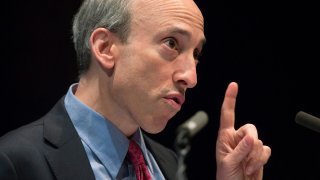
- SEC Chairman Gary Gensler said Tuesday that Wall Street's top regulator is working to determine if payment for order flow needs to be reformed or barred.
- "Our markets have moved to zero commission, but it doesn't mean it's free. There's still payment underneath these applications," he said.
- Washington and Wall Street alike blamed gamification for violent swings in GameStop, AMC Entertainment and other stocks earlier this year.
Securities and Exchange Commission Chairman Gary Gensler said Tuesday that Wall Street's top regulator is working to determine if payment for order flow needs to be reformed or barred to ensure a competitive marketplace for buying and selling trading volume.
Gensler acknowledge that modern agreements between brokers and market makers have made trading far cheaper and efficient than in prior decades, but noted that some troubling conflicts of interest remain.
"Our markets have moved to zero commission, but it doesn't mean it's free. There's still payment underneath these applications. And it doesn't mean it's always best execution," the SEC chief said on CNBC's "Squawk on the Street."
Get Philly local news, weather forecasts, sports and entertainment stories to your inbox. Sign up for NBC Philadelphia newsletters.
Online brokerages that tout "free" or zero-commission trading typically make money by selling their customers' orders to high-frequency market makers who execute the buying and selling. That process is controversial and known on Wall Street as payment for order flow.
And since only a couple of firms, including Citadel Securities, handle most of the trading volume in the U.S., Gensler and other regulators worry that they could use their clout to overcharge brokerages for trade execution.
"We've had cases that we've announced in the last 18 months where there has been this conflict between the broker on the one hand and this payment for order flow on the other," Gensler added.
Money Report
Some suspect that the conflict of interest has led to the rise of "gamification" in securities trading since brokerages like Robinhood Securities make more profit when their customers trade more.
"If you place a retail market order, as shown in this report, the vast majority of those don't go to the transparent, lit markets. They go to the dark market – these pools that are not competing," Gensler said Tuesday. "So I've asked staff: 'Can we achieve this simple concept?' That your order, when you place it, competes with other orders."
While a final decision on how to regulate payment for order flow is expected to be months away, Gensler has said the SEC is considering a wide range of options. They include greater disclosure and acknowledgment requirements, an outright ban on the practice or other avenues to increase transparency in the industry.
Washington and Wall Street alike blamed gamification for violent swings in GameStop, AMC Entertainment and other stocks earlier this year.
The SEC on Monday released its long-awaited analysis of the GameStop mania, and said that game-like features raised concerns about back-end payments that brokerages receive, gamification, as well as disclosures on short sales.
The regulator stopped short, however, of laying blame on a single cause or entity.
"Payment for order flow and the incentives it creates may cause broker-dealers to find novel ways to increase customer trading, including through the use of digital engagement practices," SEC officials said in the report.
Gensler added Tuesday morning that the SEC is now turning its attention to short selling, settlement, conflicts involving digital engagement practices and market structure. Then the commissioners will weigh in and the agency will put the recommendations out for public comment, he said.
— CNBC's Yun Li contributed to this report.






